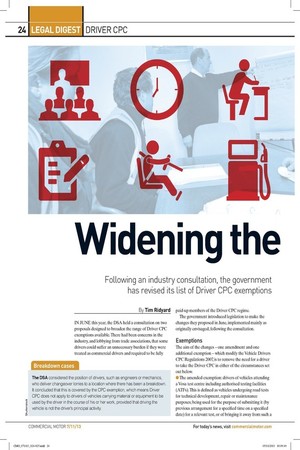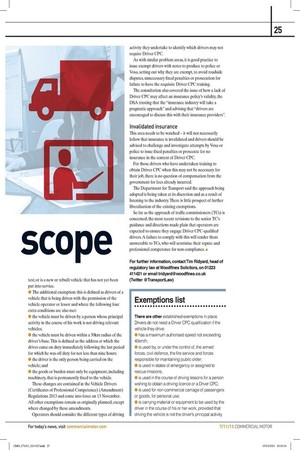Widening the
Page 18

Page 19

If you've noticed an error in this article please click here to report it so we can fix it.
scope
Following an industry consultation, the government has revised its list of Driver CPC exemptions By Tim Ridyard IN JUNE this year, the DSA held a consultation on two proposals designed to broaden the range of Driver CPC exemptions available. There had been concerns in the industry, and lobbying from trade associations, that some drivers could suffer an unnecessary burden if they were treated as commercial drivers and required to be fully
paid-up members of the Driver CPC regime.
The government introduced legislation to make the changes they proposed in June, implemented mainly as originally envisaged, following the consultation. Exemptions
The aim of the changes — one amendment and one additional exemption — which modify the Vehicle Drivers CPC Regulations 2007, is to remove the need for a driver to take the Driver CPC in either of the circumstances set out below. • The amended exemption: drivers of vehicles attending a Vosa test centre including authorised testing facilities (ATFs). This is defined as vehicles undergoing road tests for technical development, repair or maintenance purposes; being used for the purpose of submitting it (by previous arrangement for a specified time on a specified date) for a relevant test, or of bringing it away from such a
test; or is a new or rebuilt vehicle that has not yet been put into service. • The additional exemption: this is defined as drivers of a vehicle that is being driven with the permission of the vehicle operator or lessor and where the following four extra conditions are also met: • the vehicle must be driven by a person whose principal activity in the course of his work is not driving relevant vehicles; • the vehicle must be driven within a 50km radius of the driver's base. This is defined as the address at which the driver came on duty immediately following the last period for which he was off duty for not less than nine hours; • the driver is the only person being carried on the vehicle; and
• the goods or burden must only be equipment, including machinery, that is permanently fixed to the vehicle.
These changes are contained in the Vehicle Drivers (Certificates of Professional Competence) (Amendment) Regulations 2013 and come into force on 13 November. All other exemptions remain as originally planned, except where changed by these amendments. Operators should consider the different types of driving
activity they undertake to identify which drivers may not require Driver CPC.
As with similar problem areas, it is good practice to issue exempt drivers with notes to produce to police or Vosa, setting out why they are exempt, to avoid roadside disputes, unnecessary fixed penalties or prosecution for failure to have the requisite Driver CPC training.
The consultation also covered the issue of how a lack of Driver CPC may affect an insurance policy's validity, the DSA trusting that the "insurance industry will take a pragmatic approach" and advising that "drivers are encouraged to discuss this with their insurance providers". Invalidated insurance
This area needs to be watched — it will not necessarily follow that insurance is invalidated and drivers should be advised to challenge and investigate attempts by Vosa or police to issue fixed penalties or prosecute for no insurance in the context of Driver CPC.
For those drivers who have undertaken training to obtain Driver CPC when this may not be necessary for their job, there is no question of compensation from the government for fees already incurred.
The Department for Transport said the approach being adopted is being taken at its discretion and as a result of listening to the industry. There is little prospect of further liberalisation of the existing exemptions. So far as the approach of traffic commissioners (TCs) is concerned, the most recent revisions to the senior TC's guidance and directions made plain that operators are expected to ensure they engage Driver CPC-qualified drivers. A failure to comply with this will render them answerable to TCs, who will scrutinise their repute and professional competence for non-compliance. •
Exemptions list
There are other established exemptions in place. Drivers do not need a Driver CPC qualification if the vehicle they drive: • has a maximum authorised speed not exceeding 45km/h; • is used by, or under the control of, the armed forces, civil defence, the fire service and forces responsible for maintaining public order; • is used in states of emergency or assigned to rescue missions; • is used in the course of driving lessons for a person wishing to obtain a driving licence or a Driver CPC; • is used for non-commercial carriage of passengers or goods, for personal use;
• is carrying material or equipment to be used by the driver in the course of his or her work, provided that driving the vehicle is not the driver's principal activity.








































